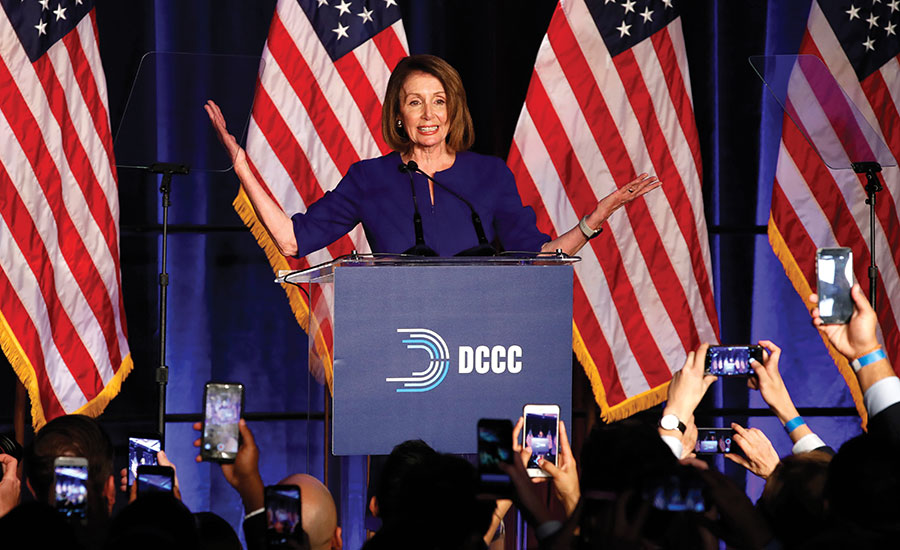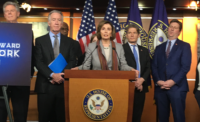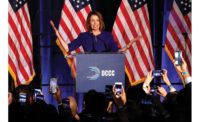With Democrats winning enough House seats on Election Day to gain a House majority, Minority Leader Nancy Pelosi (D-Calif.) says that major infrastructure legislation will be high on the party’s agenda.
Speaking shortly after media organizations projected that Democrats would gain at least the 23 seats needed to take House control, Pelosi said, “We will deliver a transformational investment in America’s infrastructure to create more good-paying jobs, rebuilding our roads, bridges, schools, water systems, broadband networks…housing and beyond.”
Senate Majority Leader Mitch McConnell (R-Ky.) told reporters at a Nov. 7 morning press conference that he had talked with Pelosi earlier that day. McConnell said, "The one issue Leader Pelosi and I have discussed this morning where there could be a possible bipartisan agreement would be something on infrastructure." He provided no details.
Trump also brought up infrastructure during a press conference later on Nov. 7. He said, "Hopefully we can all work together next year to continue delivering for the American people, including on economic growth, infrastructure, trade, lowering the cost of prescription drugs. Tthese are some of the things that the Democrats do want to work on and I really believe we'll be able to do that."
President Trump had said in an Oct. 11 television interview that there’s “a possibility” that his administration and Democrats can “get along” with each other.
He added: “They want infrastructure…. I want infrastructure. There’s something that can bring us together.”
In February, Trump proposed what he said would be a $1.5-trillion infrastructure investment plan that relied largely on private-sector dollars, but the idea didn’t advance beyond the proposal stage.
Pelosi didn’t say how large a program House Democrats envision or how it would be paid for.
For the Associated General Contractors of America, the leading legislative goal will be working toward “the kind of significant infrastructure measures the president has long promised,” CEO Stephen Sandherr said in a statement.
Sandherr added that AGC expects Republican and Democratic leaders “to make infrastructure a top priority early in the new year.”
Enacting an infrastructure bill that would include clean energy standards also is a top priority for major environmental groups, leaders of those organizations said in a Nov. 7 press briefing.
Earlier proposals
In March, Senate Democrats unveiled a $1-trillion, 10-year infrastructure proposal, composed completely of direct federal spending. It, too, languished on Capitol Hill.
The current Congress, and construction industry groups, have achieved some more modest successes this year on the infrastructure front, including a $20-billion appropriations infusion for fiscal years 2018-2019, spread among transportation, water and other programs.
Lawmakers also passed, and Trump signed, multi-year legislation reauthorizing Federal Aviation Administration programs, including airport construction grants.
In addition, Congress approved and Trump signed a water infrastructure measure, authorizing $3.7 billion for Army Corps of Engineers projects and $1.4 billion for drinking-water systems.
But the central hurdle in passing infrastructure legislation in the $1-trillion range over a decade will be finding the revenue to pay for it.
Voters sent mixed messages in the Nov. 6 midterm elections. Along with Democrats' House gains, Republicans added a few seats to their Senate majority.
New committee chairs
In the House, along with the new leadership team, a new set of Democratic committee chairs will play leading roles in developing any infrastructure legislation.
One of the key players will be Rep. Peter DeFazio (D-Ore.), who is expected to chair the Transportation and Infrastructure Committee. DeFazio said on Nov. 7 he would pursue an infrastructure plan, with a goal of $500 billion for surface transportation and additional funds for airport and water infrastructure.
Other important committee chairs will be Rep. Richard Neal (D-Mass.), expected to lead the tax-writing Ways and Means panel, and Rep. Nita Lowey (D-N.Y.), the likely chair of the Appropriations Committee. .
'Green' groups pleased
Environmental advocates were jubilant about the election results. They said they see the outcomes as a referendum on an administration and Congress that they view as more sympathetic to industry than the environment. That has included proposals that would end long-standing protections for public lands and clean air.
The new Democratic majority in the House should be able to stanch some of the bleeding, Wendy Wendtlandt, Environment America senior vice president and political director, said at the press briefing. "We feel confident that the House will be able to stand up and fight against environmental rollbacks," she said.
Gene Karpinski, president of the League of Conservation Voters, said that even with fewer Democrats in the Senate, the "Green Firewall' in that chamber—lawmakers who typically vote against bills that environmental organizations oppose—remains intact.
He added that in the new Congress, "the firewall won't have to play the kind of defense that it did, because we have the new leadership of a pro-environment majority in the House."
Story updated 11/7/2018 with comments from Senate Majority Leader McConnell, President Trump and environmental groups.





